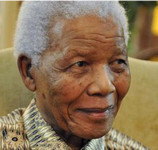
Superman is not returning to save us. If we can all come to terms with this, our chances of moving forward will grow.
The election campaign has highlighted our national debate’s enduring obsession with "leadership". Posters urge voters to support the African National Congress (ANC) "for Madiba". The Democratic Alliance (DA) tries to convince ANC voters that they should vote for it so that the reign of good presidents Nelson Mandela and Thabo Mbeki can return to replace that of bad president Jacob Zuma.
Archbishop Desmond Tutu contrasts the glorious days of Mandela with the horrors of the present, while Tony Leon, with reservations, compares the greatness of our first democratic president with the flaws of our present incumbent.
Across a fairly wide spectrum, there is a common theme: our successes and failures are down to the quality of our leaders. Much of this focuses on the head of government and is meant to draw attention to the failings of our present president. But not all of it is — the Congress of South African Trade Unions’ problems are usually reduced to questions about Zwelinzima Vavi.
Much of our debate is interested only in whether we have the right "leadership".
This habit is so ingrained that it leads major political parties to send messages that are as likely to hurt as to help them. If the DA is right that ANC leadership started veering off course only in 2007, why not stick with it as it is electing another leader in only three years? ANC messages drawing attention to Mandela are more likely to turn off voters, who will find today’s leaders lacking compared with a global icon, than to keep them in the fold.
So those who shape the national debate are so fixated on "leadership" that they cling to it even when doing this could damage them. This is not surprising, as the obsession is also damaging our country by leading us away from dealing with our problems.
It is healthy for citizens to criticise the performance of those who occupy positions of public trust (private and public) and, if necessary, to campaign for them to be replaced. But leadership obsession here goes way beyond this. It suggests that our country’s success or failure depends on the quality of our leaders — and often only on that of the person who heads the government.
It claims that we were led to an ideal state by Mandela and plunged into trouble by Zuma (whether Mbeki was hero or villain depends on your side of the fence). And so it implies that leaders have almost magical powers to save or ruin us.
This is not a democratic attitude. It suggests that our fate is decided by a few great individuals and that the rest of us do not matter much: it is no accident that many who stress leadership dismiss their fellow citizens as unfit to decide what is best for them.
In reality, the evidence — here and elsewhere — shows that people can work out what is best for them, even if they don’t have much schooling. They are often forced to put up with abuses of trust or policies that ignore their needs because they have no power, not because they don’t know what is good for them. It is also a way of passing the buck.
If the problem is "leadership", you don’t need to say in detail what is wrong and what could fix it — the good leader will presumably know what is needed. Nor do you need to look at what you can do better. While many in our society are forced to depend on what people with power do, they are not heard in the public debate.
Those who are heard can contribute more, but it is far more convenient to deny responsibility by shunting the problem off to "leaders". It misleads us about our problems and their possible solutions.
It is not true that we lived in a blissful state in the years after 1994 and that things went horribly wrong in 1999 or 2009. We inherited problems when democracy began — we have begun dealing with some of them and have failed to grapple with others, such as finding a way to address poverty and inequality without damaging our ability to create wealth. This is a constant reality over the two decades, regardless of who was president. One reason is that these are not problems that can be solved by the government alone: other actors have to change too.
So, the solution to our problems does not hinge on the identity of our leaders (or leader). If the president stepped down today — and this generation of governing party leaders went with him — we would still face a host of problems that require action by many actors. The leadership fixation would also saddle the next group of leaders with expectations they could not possibly meet so that, very soon, we would be bemoaning their shortcomings too.
We do ourselves no favours when we confuse the very necessary job of making sure leaders account to us with the mistaken belief that they have powers no human possesses.
Caption: Former president Nelson Mandela. Picture: SOWETAN
BY STEVEN FRIEDMAN
Friedman is director of the Centre for the Study of Democracy.
Article Source: Business Day
